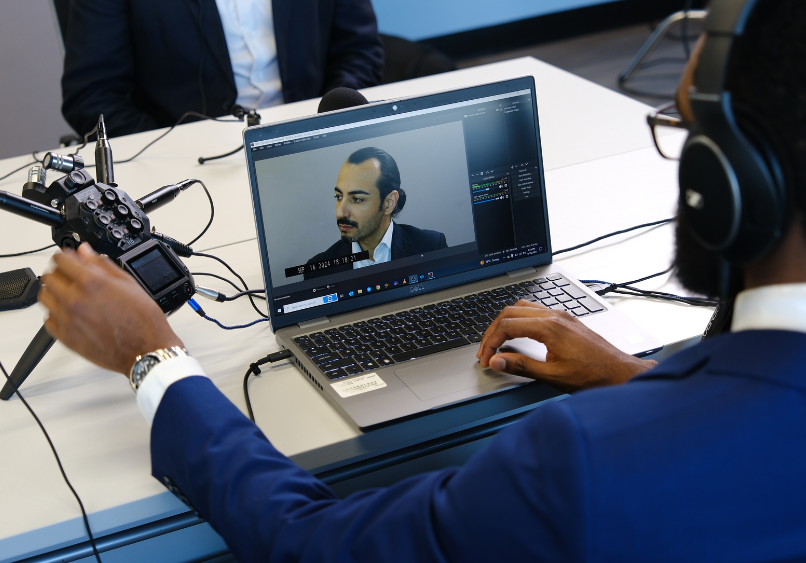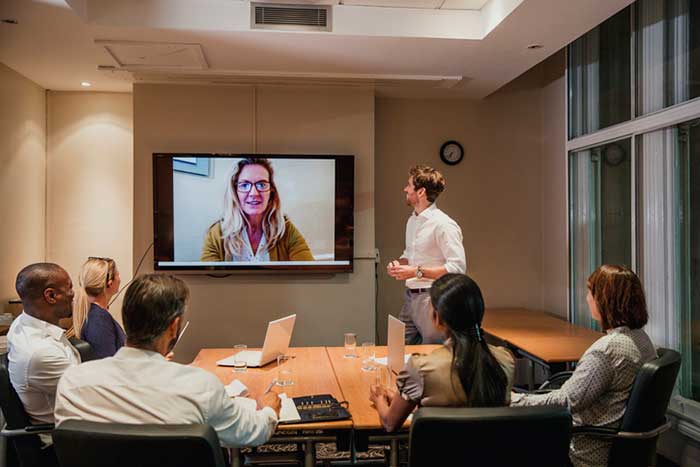The Importance of Lawful Video Clip Depositions in Modern Legal Providers: What You Need to Know
Lawful video clip depositions have become vital in today's legal landscape. They offer a multidimensional view of witness testaments that typical records just can not match. By capturing both spoken and non-verbal communication, these depositions enhance the total understanding of a witness's credibility. Nonetheless, the performance of video depositions rests on numerous aspects, including conformity with legal criteria and finest practices (legal video depositions). Exploring these aspects exposes their true value in contemporary lawful services
What Are Legal Video Depositions?
Legal video clip depositions function as a crucial tool in the litigation process. They entail videotaping witness testaments in a video clip format, recording both non-verbal and verbal communication. This approach permits attorneys to document the disposition, expressions, and reactions of witnesses, giving a richer context for the statement. Usually carried out in a regulated setting, these depositions are led by attorneys that ask concerns while a court reporter documents the dialogue. The resulting video can be crucial for test preparation, as it makes it possible for attorneys to evaluate the reliability of witnesses and improve their techniques. Additionally, legal video clip depositions can be utilized in different lawful contexts, ranging from civil disagreements to criminal situations. The acoustic and aesthetic aspects of video clip depositions enhance the discussion of evidence, making it an important part in the modern legal landscape. On the whole, they contribute significantly to the efficiency and efficiency of lawful proceedings.

Advantages of Video Clip Depositions Over Conventional Approaches
Video depositions supply many advantages contrasted to traditional techniques of taking witness testimonies. One substantial benefit is the capability to capture both audio and visual elements, giving an extra comprehensive document of the witness's statements. This double layout enhances clearness and permits lawyers to reference details nuances during test prep work. Additionally, video depositions promote remote involvement, making it less complicated for witnesses that might be unavailable for in-person appearances due to geographical restrictions or health and wellness issues.Moreover, video clip depositions can accelerate the total deposition procedure, lowering the moment and prices related to traveling and logistics. They additionally boost accessibility, as tape-recorded depositions can be easily shared among legal groups and referenced at any kind of time. This ease adds to far better instance monitoring and prep work. In general, video depositions represent a modern, reliable strategy to collecting witness statements, lining up with the developing needs of the lawful career.
The Function of Body Language and Tone in Testimonies

In lawful video depositions, body movement and tone play crucial roles in sharing a witness's integrity and credibility. Nonverbal signs can supply insights right into a witness's emotion, affecting how their statement is perceived. Comprehending the impact of these components is vital for jurors and lawyers alike when assessing the integrity of a testimony.
Nonverbal Interaction Insights
While verbal communication is often highlighted in lawful testimonies, nonverbal signs such as body language and tone play a necessary role in communicating reputation and emotion. Onlookers of depositions might note that a witness's position, motions, and faces can significantly affect assumptions of reliability. For circumstances, regular eye contact may signal confidence, while staying clear of stare could suggest dishonesty or discomfort. The tone of voice-- its speed, pitch, and volume-- can impart feelings of genuineness or uncertainty. Attorneys must be attuned to these nonverbal signals, as they frequently provide crucial context that complements spoken words. Understanding these nuances can boost the efficiency of depositions and influence the outcome of legal process.
Psychological Tone Effect
The emotional tone conveyed throughout lawful testimonies greatly influences just how a witness is viewed. Body language, singing inflections, and faces play vital duties fit the narrative of a testimony. A witness showing confidence through constant eye get in touch with and a calm tone can infuse a sense of reliability and involvement. On the other hand, signs of anxiousness, such as fidgeting or an unstable voice, might cause hesitation regarding their account. The nuances of emotional expression can affect the interpretation of truths, making it important for attorneys to identify these hints. In video clip depositions, the acoustic and visual parts integrate, stressing the importance of psychological tone in conveying genuineness and reliability within the legal procedure.
Reliability and Dependability
A vital aspect in developing trustworthiness and reliability during statements depends on the witness's body language and tone of voice. Onlookers often depend on non-verbal signs-- such as eye call, posture, and gestures-- to examine a witness's genuineness. A witness that maintains eye contact Look At This and displays open body language may be perceived as more trustworthy and straightforward than one that stays clear of eye call or shows up shut off. In addition, intonation plays a crucial duty; a constant, tranquil tone can strengthen the integrity of the testament, while changes in pitch or volume may raise uncertainties. Inevitably, the mix of body movement and vocal tone greatly influences just how a witness's declarations are gotten and interpreted in a lawful context.
Ideal Practices for Carrying Out Video Clip Depositions
Performing video depositions requires mindful preparation and execution to guarantee a clear and reliable presentation of testimony. Initially, it is essential to choose a silent, well-lit place to minimize distractions and safe and secure ideal video clip high quality. The equipment must be evaluated in advance, including cameras, microphones, and illumination, to stay clear of technical concerns during the deposition.Next, celebrations involved need to review the style and treatments in advance, making certain that everyone comprehends their duties. The deponent ought to be oriented on the procedure, including exactly how to respond clearly and concisely.Additionally, keeping a professional attitude throughout the session is important. This includes avoiding talking over each other and verifying that all concerns are routed appropriately. It is essential to record the deposition in a format that enables for simple playback and evaluation, protecting the honesty of the testament for future usage.
Lawful Factors To Consider and Conformity Issues
Just how do lawful factors to consider and conformity concerns influence the performance of video clip depositions? Lawful specialists have to browse an intricate landscape of regulations, ensuring that video depositions adhere to administrative regulations and criteria. Conformity with regulations worrying privacy, permission, and tape-recording methods is important. Getting specific permission from all parties entailed is needed to avoid lawful repercussions.Additionally, the admissibility of video evidence in court can pivot on compliance with step-by-step demands. Guaranteeing that the tools utilized meets technological requirements is also crucial, as bad top quality can threaten the deposition's reliability.Moreover, lawyers need to understand any kind of particular state laws that regulate video depositions, as these can differ greatly. Failing to address these factors to consider can not only endanger the honesty of the deposition however additionally impact the total case method, ultimately impacting the customer's legal results.
Just How Video Depositions Effect Court Perception
While video clip depositions can function as powerful devices in lawful proceedings, their influence on court assumption is significant. The acoustic and visual aspects of video clip recordings provide jurors with a more complete understanding of witness disposition, integrity, and psychological responses. This multimedia method can boost the jurors' capacity to assess the reliability of statement contrasted to standard text-based transcripts.Moreover, video clip depositions permit jurors to observe body movement, tone of voice, and facial expressions, every one of which can impact their interpretation of the witness's statements. The existence of a witness on display can humanize them, promoting compassion and connection, which may guide jurors' viewpoints. On the other hand, a witness that shows up unreliable or incredibly elusive on video clip might cause unfavorable assumptions that influence a court's choice. Eventually, the vibrant nature of video clip depositions plays a crucial function in forming exactly how jurors translate evidence and reach their verdicts.
The Future of Video Depositions in Legal Technique
As innovations in modern technology remain to improve the legal landscape, browse around these guys the future of video depositions is poised for substantial advancement. Advancements such as expert system, virtual fact, and boosted video conferencing tools are anticipated to enhance the deposition process and boost access. Lawful professionals might use AI-driven analytics to evaluate witness reliability and case toughness much more effectively.Moreover, the integration of digital reality can enable juries to experience immersive simulations of depositions, supplying deeper context and understanding. In addition, the pattern towards remote depositions is likely to linger, using greater versatility for clients and attorneys alike.As remote job ends up being increasingly normalized, video clip depositions will likely come to be basic technique, reducing expenses and time constraints related to traditional techniques. Overall, these technological innovations promise to improve the efficiency, efficiency, and access of video depositions in legal technique, ultimately transforming exactly how lawyers get ready for test.
Regularly Asked Questions
Just How Much Do Lawful Video Clip Depositions Typically Expense?

Can Video Clip Depositions Be Utilized in Any Kind of Situation?
Video depositions can be utilized in numerous kinds of situations, including civil, criminal, and family members legislation. Their flexibility permits lawyers to present witness testaments successfully, adapting to the specific demands of different lawful scenarios.
What Equipment Is Required for a Video Clip Deposition?
To conduct a video clip deposition, necessary devices consists of a top notch video camera, microphone, lighting, and click this a trusted recording gadget. In addition, a computer with editing software application might be needed for post-production and formatting the final video.
The length of time Does a Regular Video Deposition Last?
A regular video deposition lasts in between 2 to four hours, relying on the complexity of the situation and the variety of questions presented. Extensive sessions may happen, yet breaks are usually included for participant convenience.

Are Video Depositions Admissible in Court?
Video depositions are typically acceptable in court, offered they follow legal standards and guidelines of evidence. Their use boosts quality and maintains witness testament, helping in the judicial process during trials and hearings. Lawful video clip depositions have become important in today's legal landscape. In addition, lawful video depositions can be utilized in various lawful contexts, varying from civil conflicts to criminal cases. Additionally, video clip depositions assist in remote involvement, making it easier for witnesses that might be unavailable for in-person looks due to geographical restraints or health and wellness issues.Moreover, video depositions can quicken the general deposition process, lowering the time and expenses associated with traveling and logistics. Making sure that the equipment made use of satisfies technical criteria is also vital, as bad quality can weaken the deposition's reliability.Moreover, attorneys have to be aware of any kind of details state legislations that govern video depositions, as these can differ significantly. Additionally, the pattern towards remote depositions is likely to linger, offering better flexibility for clients and lawyers alike.As remote job becomes significantly normalized, video depositions will likely come to be basic method, reducing expenses and time restraints associated with standard approaches.
Comments on “How to prepare effectively for legal video depositions”